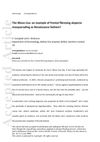 4 citations,
July 1996 in “Annals of Internal Medicine”
4 citations,
July 1996 in “Annals of Internal Medicine” High doses of fluconazole can cause reversible hair loss.
 2 citations,
February 2014 in “Journal of the European Academy of Dermatology and Venereology”
2 citations,
February 2014 in “Journal of the European Academy of Dermatology and Venereology” High levels of prolactin in the blood can be linked to widespread hair loss.
 2 citations,
August 2011 in “Revista Medica De Chile”
2 citations,
August 2011 in “Revista Medica De Chile” A postmenopausal woman's high testosterone levels and symptoms improved after removing a tumor from her ovary.
1 citations,
January 2023 in “Journal of Obstetrics and Gynaecology” High DHEA and short cervical length in women with PCOS and recurrent miscarriages may harm pregnancy outcomes.
1 citations,
September 2021 in “Pharmaceutics” High-dose finasteride may help treat glioblastoma but needs localized delivery for effectiveness.
 March 2024 in “BMC cancer”
March 2024 in “BMC cancer” High levels of ST14 and TMEFF1 proteins in ovarian cancer are linked to worse patient outcomes and may be a new treatment target.
 July 2022 in “Journal of Investigative Dermatology”
July 2022 in “Journal of Investigative Dermatology” High platelet numbers in PRP may not be essential for hair growth, and certain growth factors could negatively affect treatment outcomes for hair loss.
January 2021 in “Lecture notes in mechanical engineering” High temperatures, acidic conditions, and too much coconut oil damage hair, while a pH of 5 to 7 keeps it healthy.
April 2019 in “Journal of the Endocrine Society” A woman's severe insulin resistance improved with treatment, but she still had high testosterone levels due to ovarian issues.
 September 2018 in “Fertility and Sterility”
September 2018 in “Fertility and Sterility” High levels of testosterone and anti-Müllerian hormone before pregnancy are linked to a higher risk of newborns needing intensive care.
 November 2014 in “John Wiley & Sons, Ltd eBooks”
November 2014 in “John Wiley & Sons, Ltd eBooks” Eating high-glycemic and dairy foods can increase hormones that may cause acne and other health issues.
 August 2013 in “Fertility and Sterility”
August 2013 in “Fertility and Sterility” High levels of fatty acids are linked to increased androgen production and inflammation in women with PCOS, which may affect IVF outcomes.

High insulin levels are more common and a better predictor of carbohydrate issues in women with PCOS than glucose tolerance tests.
 66 citations,
November 2001 in “European journal of endocrinology”
66 citations,
November 2001 in “European journal of endocrinology” Low SHBG and high FAI, FT, and DHEAS levels are effective in identifying PCOS.
 40 citations,
March 2017 in “The journal of investigative dermatology/Journal of investigative dermatology”
40 citations,
March 2017 in “The journal of investigative dermatology/Journal of investigative dermatology” Growing hair follicles have high mitochondrial activity and ROS in specific regions, aiding hair formation.
 37 citations,
January 2004 in “Hormone Research in Paediatrics”
37 citations,
January 2004 in “Hormone Research in Paediatrics” About 3% of high school girls aged 14-18 in Isfahan, Iran, have polycystic ovary syndrome.
 30 citations,
March 2015 in “Clinical Endocrinology”
30 citations,
March 2015 in “Clinical Endocrinology” Young women with high male hormone levels or PCOS often feel more psychological distress and have a lower quality of life.
 17 citations,
April 1975 in “The Journal of Pediatrics”
17 citations,
April 1975 in “The Journal of Pediatrics” Minoxidil effectively controls severe high blood pressure in children with few side effects.
 7 citations,
August 2019 in “Clinical and Experimental Dermatology”
7 citations,
August 2019 in “Clinical and Experimental Dermatology” The Mona Lisa's high forehead and sparse eyebrows might be due to a hair loss condition or Renaissance fashion trends, but the actual reason is unknown.
 7 citations,
August 1989 in “The Journal of Dermatologic Surgery and Oncology”
7 citations,
August 1989 in “The Journal of Dermatologic Surgery and Oncology” Facelifts can lead to high patient satisfaction and a quick recovery when done correctly.
 6 citations,
December 2015 in “JAMA”
6 citations,
December 2015 in “JAMA” The woman's high testosterone levels indicated PCOS, leading to treatment that improved her symptoms.
1 citations,
March 2012 in “Journal of pediatric & adolescent gynecology” A young girl with high testosterone was thought to have a tumor but actually had PCOS, which was treated with birth control pills.
 1 citations,
November 2007 in “Humana Press eBooks”
1 citations,
November 2007 in “Humana Press eBooks” Most cases of high male hormone levels in women are due to polycystic ovary syndrome.
 January 2025 in “Recent Patents on Anti-Cancer Drug Discovery”
January 2025 in “Recent Patents on Anti-Cancer Drug Discovery” The treatment showed high response rates and was well-tolerated, potentially extending patient survival.
 October 2023 in “Journal of the Endocrine Society”
October 2023 in “Journal of the Endocrine Society” Joint replacement surgery normalized high alkaline phosphatase levels in a patient with severe osteoarthritis.
 November 2018 in “Endocrine Abstracts”
November 2018 in “Endocrine Abstracts” A woman's high testosterone levels were caused by a rare ovarian tumor, not the initially diagnosed condition.
 January 2017 in “SM dermatology journal”
January 2017 in “SM dermatology journal” Eyebrow hair transplants have high patient satisfaction and require surgeons to have artistic and technical skills.
 129 citations,
January 2009 in “International Journal of Trichology”
129 citations,
January 2009 in “International Journal of Trichology” Trichoscopy can diagnose female hair loss with high accuracy by looking for specific patterns in hair and scalp appearance.
 49 citations,
November 2019 in “Egyptian Journal of Medical Human Genetics”
49 citations,
November 2019 in “Egyptian Journal of Medical Human Genetics” Certain gene variants may contribute to high androgen levels in women with polycystic ovary syndrome.
 18 citations,
September 2006 in “Dermatologic Surgery”
18 citations,
September 2006 in “Dermatologic Surgery” Aggressive scalp squamous cell carcinomas have a high death rate and need early, strong treatment.

























